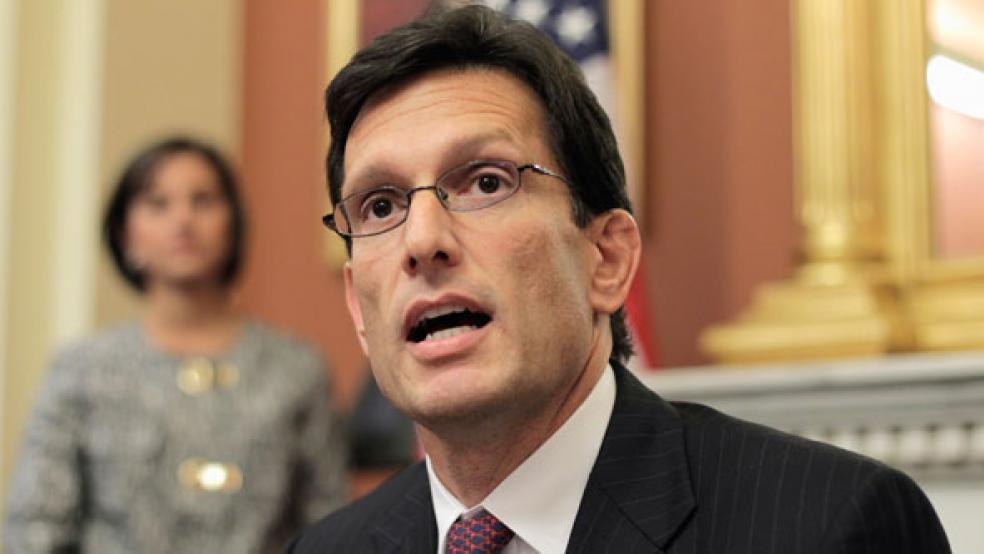House Majority Leader Eric Cantor, the pugnacious conservative who has championed tough fiscal measures to downsize the government and shred the social safety net, showed a much kinder, gentler side today as he outlined a new legislative agenda designed to making life easier for average working-class Americans.

During an hour-long appearance at the right leaning American Enterprise Institute, the Virginia Republican stressed how the federal government can do much more to help average families pull through the economic recovery while downplaying the Republicans’ long standing austerity message of slashing federal spending and bringing the $16.4 trillion national debt under control.
Cantor opened his speech by noting that Washington has been obsessed for months with concerns about the fiscal cliff, debt ceilings and budgets and negotiations under tough deadlines.
“All of this is very important, as there is no substitute for getting our fiscal house in order,” he said. “There is no greater moral imperative than to reduce the mountain of debt facing us, our children and theirs. The House Republican Majority stands ready for President Obama and his party to finally join us in our efforts to tackle the big problems facing America.
But today, he said, he wanted to focus attention on what lies beyond these fiscal debates. “Over the next two years, the House Majority will pursue an agenda based on a shared vision of creating the conditions for health, happiness and prosperity for more Americans and their families,” he said, “and to restrain Washington from interfering in those pursuits.”
Cantor, 49, a favorite of conservatives and Tea Party supporters, is one of a new generation of House Republican leaders and self- proclaimed “Young Guns,” who have dominated the economic and budget debate in the lower chamber. Cantor, viewed by many as a future rival to House Speaker John Boehner of Ohio, has argued that fiscal restraint, tax cuts and deregulation constitute the true path to economic prosperity. In the depths of the 2011 battle over the debt ceiling, President Obama stalked out of a White House meeting with congressional leaders after clashing with the abrasive Cantor over the extension of the debt ceiling.
But today, Cantor was sweetness and light and promoted a far different agenda – one that includes granting more visas for highly educated workers, eliminating medical-device taxes and simplifying tax filings. Cantor stressed that while Republicans will continue to press for policies that pare down the deficit and scale back the size of government, Republicans also are concerned about making government more efficient for consumers and enhancing the quality of life for average voters. Cantor said his party must do a far better job in explaining why they are for fiscal discipline and how they want to help people.
Above all, he said, Congress must do far more to expand educational opportunities, in public and private schools, for children from kindergarten through college. “Just like parents, Washington must start showing care for the generations ahead while leaving the parenting to the parents,” he said. “Government policy should aim to strike a balance between what is needed to advance the next generation, what we can afford, what is a federal responsibility and what is necessary to ensure our children are safe, healthy and able to reach their dreams Opportunity and the belief in a better tomorrow start with an education system that works.
The speech had been billed as a major shift in the GOP's domestic agenda, but it largely avoided detailed major policy pronouncements. Instead, Cantor echoed other Republicans in calling for school vouchers, Medicaid and Medicare reforms, workforce training initiatives, and limited immigration reforms.
Following the speech, Cantor dodged a question about whether he would support the substance of a bipartisan immigration reform proposal in the Senate, saying he hadn’t had time to read it. But he did praise Florida Sen. Marco Rubio for his ideas on reforming the immigration system and tightening security along the U.S.-Mexican border.
In some ways, the speech was less a dramatic departure from conservative policies and principles than a bid to soften the tone of the party’s message. A placard that read, “Making Life Work for More People,” was taped to the lectern in the AEI’s 12th floor conference room, and a racially mixed group of “average Americans” from Washington, D.C. and Richmond were seated in the front rows.
Cantor frequently alluded to parents and children who overcame adversity to gain an education or who struggled with serious illness or suffered the indignities of unemployment. “These families are desperate to wake up in the morning and have the nightmare over,” he said. “The best way to restore their hope for the future and to heal our country is by making opportunity a reality for them and everyone. This comes with a growing economy, business expansion and start-ups creating jobs.”





